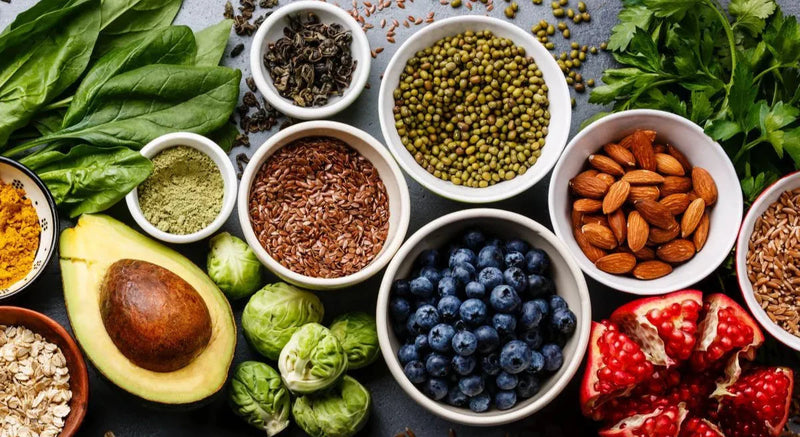Collagen and Healthful Skin Ageing
What is Collagen
Collagen makes up 75-80% of our skin, it is a fibrous, supportive protein, often referred to as the scaffolding of our skin, it provides the support matrix underpinning healthy skin. Collagen fibres form extensive and robust networks providing the dermis with strength, firmness and elasticity. Along with the protein Elastin, collagen is a key determinant in how our skin ages, contributing significantly to the youthful appearance of the skin, supporting its elasticity and preventing sagging.
There are around 28 different forms of collagen in the body, but the predominant types are Type I, II and III. However it is type I that is main collagen found in skin, representing 80%-90% of skin collagen. It is produced by cells called fibroblasts, found in the dermis (the layer below the external epidermis). Fibroblasts also produce the protein elastin, which gives skin the flexibility to stretch followed by a recoil to allow tissues to return to their original position.
Formation of Collagen
The activation of fibroblasts results in an increase in the production of collagen and elastin. Fibroblast are sensitive to the physical tension of the support matrix within which they are embedded in the dermis and to biochemical stimuli. Both of these factors not only activate fibroblast activity (ie collagen and elastin production) but they also increase the overall number of fibroblasts.
Physical tension in the support matrix (from facial massage/touch) can directly cause activation of the fibroblasts, resulting in the production of collagen and elastin. More on this later.
Biochemical stimuli from substances known as ligands can also influence an increase in fibroblast numbers and their activation by binding to receptors on the fibroblast surface. Ligands are found in a wide variety of proteins, antioxidants, vitamins, omega 3 and 6 fatty acids and a huge array of botanical extracts.
Unfortunately fibroblasts become less active in our 30’s and collagen production declines by about 1-1.5% each year, and it can be even worse for us women of a certain age, we can loose up to 30% in the first 5 years post menopause.
Lifestyle and Collagen
However collagen production and conservation isn’t only influenced by these intrinsic factors, our lifestyle greatly contributes to factors that influence collagen formation and its breakdown.
Collagen is susceptible to oxidative damage form free radicals, also known as ROS (reactive oxygen species). Free radicals account for a large proportion of the damage to skin. Natural bodily processes and our environment create a manageable degree of free radical and oxidative damage to our skin, but when the free radical load is increased or accelerated by the sun, regular exposure to pollutants, smoking, excess alcohol, poor diets, high sugar, low vitamin C the damage becomes less manageable. Collagen will be damaged, broken down and production decreased.
Taking steps to reduce or mitigate against these factors is crucial in supporting our collagen production and reducing its degradation. Reducing alcohol and avoiding smoking are generally good for overall health. They both increase the free radical load and reduce the body’s ability to detoxify.
Smoking greatly increases the need for antioxidants, particularly vitamin C which is also required for collagen production, smoking ‘steals’ vitamin C so its unavailable for collagen production!
Sun Exposure
It goes without saying that we need to be mindful of our sun exposure, however we need the action of sunlight on the skin for vitamin D synthesis, crucial for bone health, immune function and inflammation reduction.
Over exposure to UV light generates an immune response, resulting in sunburn, this is primarily to protect us from sun damage. However inflammatory by-products which result from long term exposure can damage collagen and elastin proteins, making them tough and rigid. Antioxidants can reduce the development of this damage.
Diet and Collagen
Our diet is a major influencer of our collagen and elastin status. Vitamin C is an essential ingredient required in the production of collagen and elastin. In addition, it has high antioxidant activity, thereby helping to reduce free radicals and oxidative stress too.
A diet rich in a wide variety of brightly coloured fruits and vegetables, will supply optimal amounts of vitamin C and other key antioxidants necessary for the protection and production of collagen. The following are particularly high in vitamin C, bell peppers, cruciferous vegetables (broccoli, cauliflower, cabbage, brussels sprouts), strawberries, tomatoes and citrus fruits.
Since collagen is a protein, ensuring we eat adequate amounts of quality protein to provide the essential amino acids that form the building blocks, is a must. Meat, fish, chicken, eggs, beans, bone broth, nuts and seeds provide these necessary amino acids. Bone broth is particularly beneficial as it is a natural source of preformed collagen.
Diets that rely heavily on processed and convince foods, will not supply the necessary nutrients needed for collagen production or the antioxidants to prevent its breakdown. Eating lots of processed foods not only mean we are limiting the nutrients we are providing our body, but due to the added metabolic burden they place on the liver, more of our precious antioxidants are needed to support metabolism and even less of an already low level, are available for collagen maintenance.
Sugar has an incredibly detrimental effect on our collagen. We regularly hear how sun and UV rays are the culprits of accelerated ageing but we hear very little about the role sugar plays and in my opinion this is just as important.
Too much sugar in the body and it will attach to fats and proteins in the body, this results in the formation of advanced glycation end products (AGE’s) . Collagen is a protein and when it becomes glycated by AGE’s it’s function is impaired, the scaffolding matrix losses strength, elasticity is reduced, collagen becomes rigid, weak and susceptible to breaking, the ability to hold water is lessened, skin looses plumpness, deepening lines and skin can sag. Ultimately too much sugar accelerates the ageing process just the same as too much sun!
Sleep
Ensuring you are getting enough sleep is important for collagen production, as this is the time when the collagen producing fibroblasts are hard at work. The majority of collagen production occurs between 10pm and 2am. If you’re burning the midnight oil you’re not only depriving your body of essential sleep you’re loosing the opportunity for your body to manufacture collagen.
Physical Damage to Collagen and Elastin
How we communicate physically with skin affects collagen. I mentioned earlier that fibroblasts are sensitive to physical tension in the support matrix within which they reside. Physical tension can directly cause activation of mechanoreceptors and anchoring protein strands within the matrix that initiate signalling pathways that activate of the fibroblasts, resulting in an increase in the production of collagen and elastin.
Gentle touch and massage of the face activates this mechanism, thereby stimulating collagen and elastin production. But it’s a fine balance. Elastin fibres are like elastic bands, they allow a certain amount of stretch, followed by a bounce and recoil back. But when we continually pull a rubber band, it stretches out and then eventually snaps, and this is exactly what happens in the skin, continually over stretching the elastin fibres results in a loose of ability to bounce back and may even cause breakage of these fibres.
Our touch needs to be mindful of this, enough gentle movement and pressure to activate the fibroblasts but never so much that we risk stretching or dragging the skin beyond the point that will break the elastin fibres. When cleansing and applying products be careful with the pressure you are using, avoid dragging or overly stretching skin, work gently over the surface with small circular movements, gentle press and hold movements.
Regular Facials that incorporate gentle massage techniques to safely stimulate and activate fibroblasts, assist in collagen and elastin production. The’ scaffolding’ and support matrix is strengthened, reducing line and wrinkle formation, aiding water retention slowing the ageing process, and maintaining firmer skin for a more youthful appearance.
Collagen Supplementation
I get asked regularly about supplemental collagen, it has become a very hot topic in the field of skin ageing and a veritable mine field.
Many studies show that if collagen peptides (collagen that has been broken up - 'hydrolysed', in to its small amino acids by enzyme activity) are ingested they travel throughout the body, including to sites where fibroblasts are present. This in turn stimulates fibroblasts to produce more of our own collagen, elastin and hyaluronic acid, rejuvenating skin, improving elasticity and hydration.
A recent study has gone further, showing that hydrolysed collagen peptides not only significantly increase collagen and elastin synthesis by the fibroblasts, but that the peptides significantly inhibit the release of two enzymes (metalloproteinase -1 and -3) that breakdown our own collagen. The researchers concluded that collagen supplementation could indeed have positive benefits, stating,
‘these results provided a scientific, cell-based, rationale for the for the positive effects of collagen-based nutraceutical supplements on skin properties, suggesting that enhanced formation of stable dermal fibroblast may follow their oral consumption’.
Marine Collagen has been well researched and studies suggest it to be more beneficial than supplementation of bovine collagen. Marine collagen consist mainly of type I collagen, the most abundant form of collagen in the skin and displays a high resemblance with our own collagen, this means it is easily absorbed through the intestinal wall.
When choosing a collagen supplement, ensure it is supplying a clean, safe, sustainable and bioactive form of collagen. Look particularly for formulations certified by the Marine Stewardship Council, containing type I collagen, preferably wild caught.
Two Collagen supplements I particularly like are Cytoplan Marine Collagen and BioCare Collagen Complex Capsules this one, as well as type I marine collagen also contain vitamin C to support collagen production, zinc which contributes to protein synthesis, hyaluronic acid and and a rich mix of plant antioxidants and flavonoids to support collagen production and reduce its degradation.












